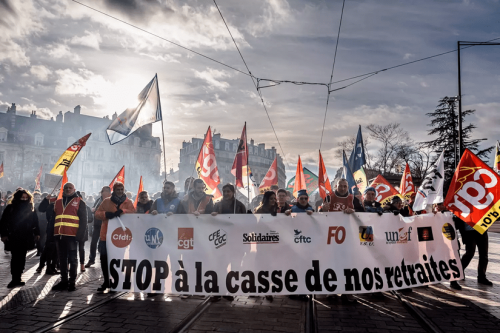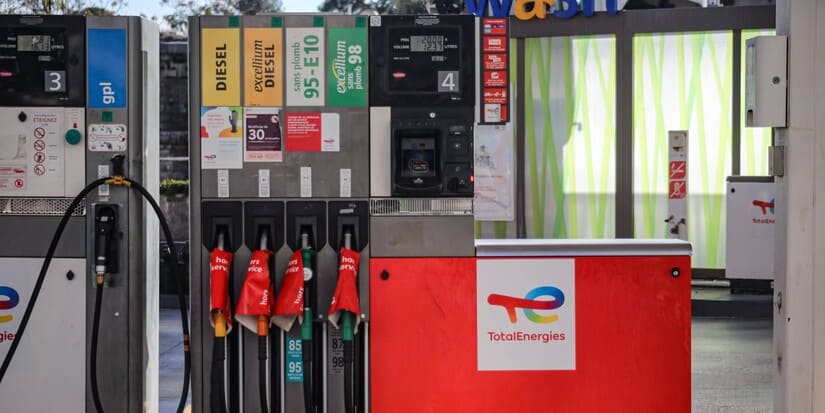Fuel prices in France have continued to rise since the beginning of this year (2023), after the end of the discounts offered by the government and Total Energy, amid fears of the repercussions of the labor union strike again on January 31.
The data – provided by the French government today, Monday, January 30, and seen by the specialized energy platform – revealed that fuel prices are rapidly approaching the barrier of 2 euros ($ 2.17) per liter.
The average price of a liter of diesel was €1,943 ($2.11), up €0.027 ($0.029) over a week, according to the latest figures from the French Environment Ministry, which cover the period from January 21-27.
On the unleaded petrol side, the average price per liter was 1,910 euros ($2.08), but after a larger weekly increase of 0.036 euros ($0.039), according to BFM TV.
(Euro = $1.09).
Fuel prices in France 2023
As expected, the end of rebates offered by the government and Total Energy led to an almost automatic rise in fuel prices in France from January 1, 2023, by more than €0.13 ($0.14) per liter for diesel and about €0.20 ($0.22) for empty petrol. of lead.
This sharp rise gave way to a short fluctuation characterized by the hypothetical stability of unleaded gasoline, or even a slight decline in diesel, as a result of the sharp drop in the price of a barrel of Brent (about $3 in one week).
But since the second week of January, fuel prices in France appear to have resumed their rise towards the €2 ($2.17) per liter mark that was already widely breached at the start of the conflict in Ukraine. This prompted the government to make a discount on a liter of fuel, whose value varied between April and December 2022, before Total Energy added its discount at the end of the summer.
Fuel subsidies in France
The government introduced a rebate of €0.30 ($0.33) per liter of fuel in September and October 2022, then the subsidy drops to €0.10 ($0.11) in November and December.
The state extended its rebate of 0.30 euros ($0.33) per liter at petrol stations until mid-November, before dropping to 0.10 euros ($0.11) until the end of 2022.
For its part, Total announced an additional discount of €0.20 ($0.22) per liter in September and October (2022), dropping to €0.10 ($0.11) in November and December 2022.
Since the discounts ended, fuel prices in France seem to be rising at a steady and guaranteed rate from week to week.
The same applies to the price of a barrel of Brent crude, which did not stay below $80 for long, even if its rise slowed between the third and fourth weeks of January.
Fuel allowance in France
Since Friday January 27 (2023), French motorists have started to receive a fuel allowance of 100 euros ($108.66), compensating for deductions.
The government has allocated 100 euros, a one-time aid for 2023, for citizens who use their cars to go to work, but so far, out of 10 million eligible people, only 3 million have applied, according to Ouest France. ).
The €100 fuel allowance is available from 16 January to 28 February 2023 and must be requested via a form on the tax website.
This assistance is paid to all people who use cars to go to work and who have a reference tax income of less than 14.7 thousand euros ($16,000) in 2021, or 1,314 euros ($1,428) per month for a single person, or 3,941 euros ($4,282). For a couple who have two children.
Couples who work and own two vehicles can benefit from two grants, i.e. 200 euros ($217.32).

Disruption of fuel supplies in France
In this context, the fuel supply in France witnessed a new disruption, after the oil workers went on strike, on January 26 and 27; Protesting the country’s pension reform.
The oil branch of the General Union of Labor called on oil refineries in France to strike for 48 hours, in preparation for the second day of the demonstration scheduled for January 31.
As during the January 19 strike, fuel shipments to depots were banned in France, and the usual slogan was: “Nothing in, nothing out”.
Total Energy said the strike had halted fuel shipments in France from several production sites.
However, she confirmed that gas stations in France had enough stock to deal with any potential strikes announced by unionized workers on Thursday.
The French company stressed that its teams are fully prepared to deal with any higher than usual demand for fuel in the places surrounding the strike.
related topics..
Also read..

Leave a Reply